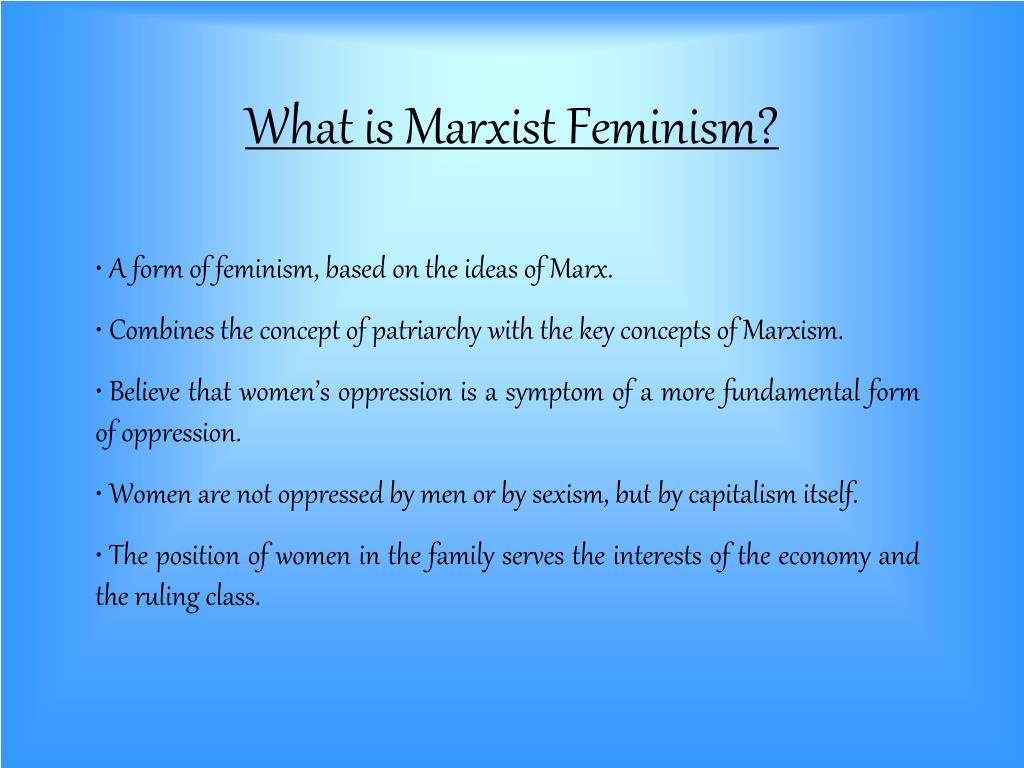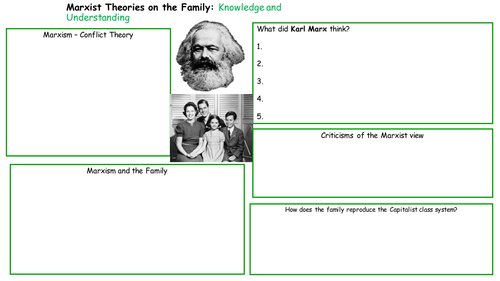Growing up, I always wondered about the concept of family. It seemed like a fundamental unit of society, but I also noticed disparities in how families functioned and the resources available to them. As I delved deeper into social and political ideologies, I encountered the concept of the “Marxist Family”, which presented a different perspective on the traditional family structure. This exploration sparked my curiosity, leading me to understand how family functions within the broader framework of capitalism and class struggle.

Image: www.slideserve.com
The Marxist Family is not a specific family type, but rather a critical lens through which to examine the role of family in a capitalist society. It highlights the ways in which the traditional nuclear family, with its perceived stability and hierarchy, reinforces existing power structures and perpetuates economic inequality.
The Marxist Family: A Critical Perspective
Marxist thought, originating from the writings of Karl Marx and Friedrich Engels, criticizes the capitalist mode of production and its impact on various aspects of society, including the family. The Marxist perspective argues that the family serves as a microcosm of the larger societal structures governed by capitalism. The family, as an institution, is viewed as a site of both production and reproduction, where individuals are shaped by and contribute to the dominant economic and social order.
Marxist theory sees the family as a unit responsible for producing and maintaining the workforce, contributing to the perpetuation of the capitalist system. In this view, families are not necessarily oppressive, but they can be seen as tools for maintaining the status quo. The family plays a crucial role in socializing individuals into a particular ideology and preparing them for their roles in the labor market.
Key Concepts of the Marxist Family
Capitalist Exploitation
The Marxist perspective highlights how the family structure is shaped by the dynamics of exploitation in a capitalist economy. Families are often compelled to prioritize economic survival, which can lead to a division of labor within the family based on gender. Women, historically, have been relegated to unpaid domestic labor, while men are expected to be the primary breadwinners. This division reinforces the traditional gender roles and perpetuates inequality within the family and the wider society.
Alienation
Marxist theory also emphasizes the concept of alienation, the sense of separation and disconnect individuals experience in a capitalist system. Alienation can affect family relationships, as individuals may feel disconnected from their work and their personal lives. This can lead to strained relationships, communication breakdowns, and emotional disconnect within the family unit.

Image: www.tes.com
The Marxist Family in the 21st Century
The traditional family models have evolved significantly in recent decades, with rising divorce rates, single-parent families, and the increasing acceptance of same-sex relationships. While these changes represent challenges to traditional notions of family, they also raise questions about the continued relevance of the Marxist perspective on the family.
Modern-day families are facing a range of new challenges. The rise of technology, globalization, and economic uncertainties have all contributed to changes in family dynamics and the ways families function. The Marxist perspective, while rooted in historical context, can still provide a framework for analyzing the social and economic forces shaping these changes.
Tips and Expert Advice
Understanding the Marxist Family as a concept can help us engage in critical dialogue about the role of family in society. Here are some tips for navigating family dynamics through a critical lens:
- Reflect on your own family structure. Consider how it has shaped your values, beliefs, and your own understanding of family.
- Recognize the impact of economic factors on your life and your family. Understand how economic inequalities can influence family dynamics.
- Embrace diversity and inclusion in your understanding of family. Respect different family configurations and the social pressures they face.
It’s essential to acknowledge that not all families experience the same challenges or face similar levels of inequality. The Marxist lens provides a framework for analyzing the larger societal forces that influence family dynamics, while recognizing the importance of individual experiences and personal circumstances.
FAQ
Q: What are some criticisms of the Marxist perspective on the family?
A: Critics argue that the Marxist perspective overlooks the positive aspects of family life and the emotional support families provide. They also contend that the focus on economic determinism is overly simplistic, failing to adequately address the complexities of individual choices and personal agency within families.
Q: Does the Marxist family concept apply to all family structures?
A: The Marxist perspective can be applied to analyze different family structures, including blended families, single-parent families, and same-sex couples. However, it is important to acknowledge that the specific challenges and dynamics within each family unit may vary.
Marxist Family
Conclusion
The Marxist perspective on the family offers a critical lens for understanding the social and economic forces that shape family dynamics. It encourages us to examine the role of the family in perpetuating existing power structures and to consider the ways we can work towards a more just and equitable society. The concept of the Marxist Family emphasizes the need for critical thinking and a deeper understanding of the societal forces that influence the family unit.
Are you interested in learning more about the Marxist Family and its implications for families today?



/GettyImages-173599369-58ad68f83df78c345b829dfc.jpg?w=740&resize=740,414&ssl=1)


